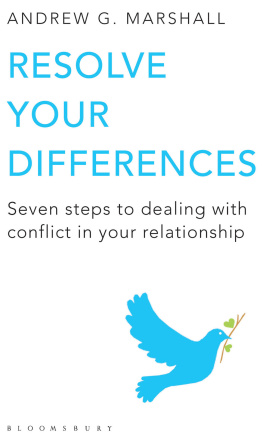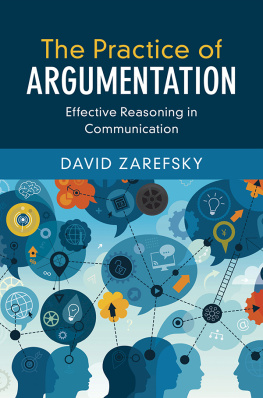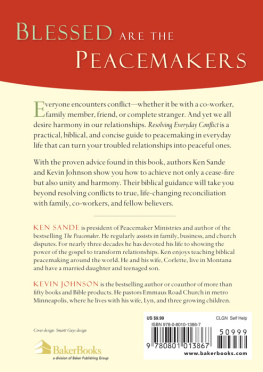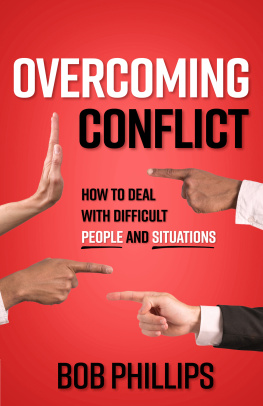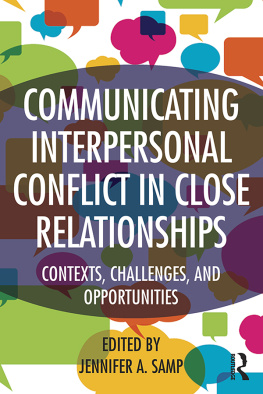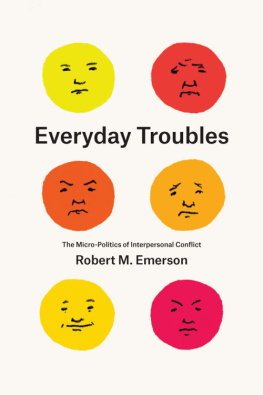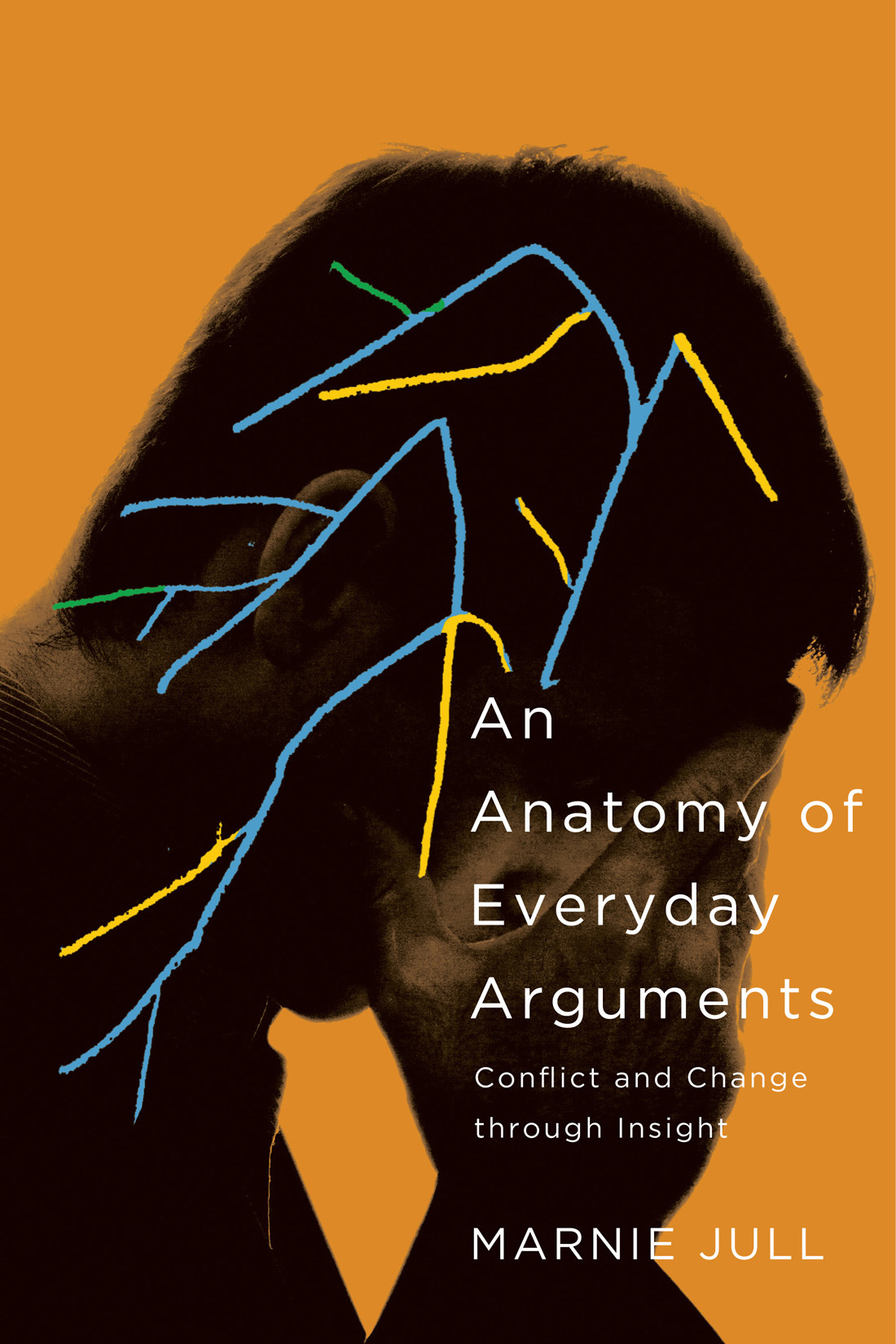AN ANATOMY OF EVERYDAY ARGUMENTS
An Anatomy
of Everyday Arguments
Conflict and Change
through Insight
MARNIE JULL
McGill-Queens University Press
Montreal & Kingston London Chicago
McGill-Queens University Press 2022
ISBN 978-0-2280-0844-6 (cloth)
ISBN 978-0-2280-0845-3 (paper)
ISBN 978-0-2280-0967-2 (e PDF )
ISBN 978-0-2280-0968-9 (e PUB )
Legal deposit first quarter 2022
Bibliothque nationale du Qubec
Printed in Canada on acid-free paper that is 100% ancient forest free (100% post-consumer recycled), processed chlorine free
We acknowledge the support of the Canada Council for the Arts.
Nous remercions le Conseil des arts du Canada de son soutien.
Library and Archives Canada Cataloguing in Publication
Title: An anatomy of everyday arguments: conflict and change through insight / Marnie Jull.
Names: Jull, Marnie, author.
Description: Includes bibliographical references and index.
Identifiers: Canadiana (print) 20210285435 | Canadiana (ebook) 20210288876 | ISBN 9780228008446 (hardcover) | ISBN 9780228008453 (softcover) | ISBN 9780228009672 ( PDF ) | ISBN 9780228009689 (e PUB )
Subjects: LCSH : Interpersonal conflict. | LCSH : Conflict management.
Classification: LCC HM 1121 . J 85 2022 | DDC 303.6dc23
This book was typeset by Marquis Interscript.
For Georgine, always
Contents
Acknowledgments
Many wonderful relationships have inspired and supported the creation of this book. Dr Cheryl Picard, as a stellar pracademic and galvanizing mentor, gave me tools and inspiration that have transformed my life. Dr Janet Siltanen was my perceptive, compassionate, and protective midwife into scholarship. Dr Ken Melchins gifts to this work were his brilliance of mind and his heart. I am grateful to the participants in the case studies, who leaned into the challenge of conflict and were generous in their spirit of mutual inquiry as well as their delight in discovery. They dispelled for me the illusion of the isolated researching mind.
My beloved friends and colleagues Jamie Price and Vieve Price have helped me immeasurably through their foundational, creative, and spiritual pathfinding. My mentor Garry Powell provided me with the treasures of emotional and intellectual support, helping me to balance the demands of research with the process of living a complex life. John Radford has influenced me deeply with his skills as a master practitioner and a humble, courageous soul.
Dr Megan Price, with her luminous intelligence, has given me clarity and warmth, and the growing community of Insight practitioners, professionals, artists, and scholars gives me hope for the future. My colleagues at Royal Roads University have created a supportive and stimulating context in which to learn and grow. In particular, the students in the universitys Conflict Analysis and Management program have challenged and inspired me to keep evolving as a companion in their learning journeys, and I frequently marvel at the many ways that they show up for this difficult work.
My mother, Helen, gave me the gifts of her superb writing, wit, and constant cheerleading, and my father, Will, provided me with an early foundation in rigorous thinking. My siblings, Carolyn, David, and Grace, helped me to learn in childhood the benefits of a good fight when the prize is reconciliation, which has matured into the inseparable bonds of family.
Moneca Kaisers creation of a writing group and loving friendship was instrumental to this work. Alison Van Rooys extraordinarily intelligent and sensitive reading of the manuscript made it possible to complete. I would not be at this place in my life without Andrea Lorients place in my heart, and Ellen Travis has been a gentle harbour for me since I was a young adult.
Khadija Coxon at McGill-Queens University Press saw and supported the potential of this book, and editor Julie McGonegal made it a more readable text. Dr David Peddle richly influenced the evolution of the manuscript with his Insight wisdom, humour, and editorial acumen.
My daughters, Sage and Roma, are the delights of my heart, inspiring me and teaching me the lessons that only deep love can provide. And my partner, Georgine intelligent, beautiful, generous, and strong is truly my other half, building the boat for us to row, doing most of the rowing, and keeping us warm with the sunshine of her love. Thank you.
AN ANATOMY OF EVERYDAY ARGUMENTS
Introduction
A conflicted working group is involved in a lengthy, high-stakes decision-making process. During one meeting, there is a heated exchange among three participants that threatens to derail the entire process. The tension is discussed, the participants become less confrontational, and the discussion moves on, with the group generating ideas that had not been imagined previously.
A consultant is angry with a colleague because she refuses to work with another associate. During a conversation with an attuned listener, the consultant changes from judging the colleague harshly to developing a plan to speak with her more compassionately about her concerns.
A mother is preoccupied with her hostility toward the hockey association that will likely exclude her deserving daughter from a competitive hockey team. In discussing her concerns with a skilled confidante, she changes from deliberating hostile actions to considering nonconflictual options.
Two life partners have a chronic dispute about a household matter. Although it is a seemingly trivial issue, their argument escalates very quickly. The helpful momentary intervention of a friend enables a radical and enduring dissipation of the dispute.
Human beings are complex. We some of us more than others get into polarized conflicts with people around us, and we get out of these conflicts, too. What is happening, really, when someone shifts away from polarized interpersonal conflict with another person?
This question is significant because these conflicts happen often and plague most of us. Not only do we become embroiled ourselves, but we can also be affected by others polarized stances. These antagonisms can arise in ordinary work meetings with many participants or in everyday activities between two people, thereby preventing progress toward hoped-for futures for organizations, groups, or individuals. Because they are so common and can have considerable impact, these kinds of conflicts are important to study in order not only to improve individual dynamics but also to benefit the workplaces, families, and communities that they affect.
There are many ways to research interpersonal argument. Although useful information about conflict and change can be gathered from quantitative methods as well as qualitative interviews, the results of this research can sometimes feel sterile or impersonal. But interpersonal struggles are by definition personal, messy, and often dramatic. So instead of a detached dissection, this book offers an anatomy of interpersonal conflict that emerges from the inside through theory, story, conversation, and practice. I use the tools of theory to explore, with as much precision as I can, how conflicts happen and how they can be changed. Although I use some difficult concepts, like intersubjectivity and operations of consciousness, I discuss them with care. What really matters to me is how to develop the skills of everyday connection that can foster larger shifts in our relationships, our organizations, and the communities where we live. If you are a reader who prefers story before theory, then you may find it helpful to begin your reading of this book at chapter 4 before returning to the earlier chapters for more theoretical or methodological depth.


